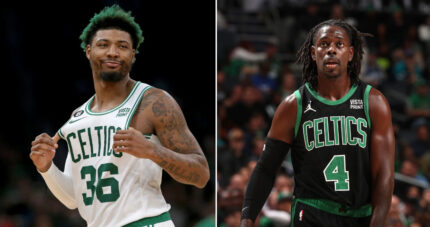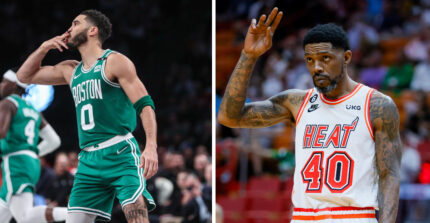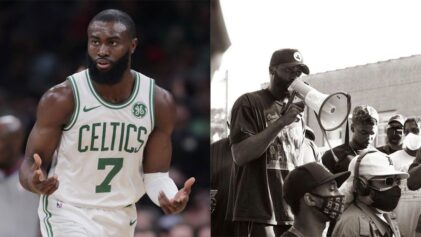2013 marks the 60th anniversary of the first time an African-American player played in the NBA All-Star game, but judging by the recent festivities in Houston, you would never know it. The forgotten All-Star player who blazed a trail for Dr. J, Kobe, Magic and LeBron to follow, went by the name of Don Barksdale.
The 6’6” forward was largely unrecognized by the hoops community until last year when he was posthumously inducted into the Naismith Basketball Hall of Fame (thanks to the Early African-American Pioneers committee). In addition to being the first African-American to play in the All-Star game, Barksdale was also the first African-American NCAA All-American (1947), the first to make the U.S. Olympic team (1948) and first to win an Olympic gold medal for basketball.
Keep in mind the climate of the world in 1948. The London Olympic Games were the first to take place since the 1936 competition in Munich, and not much had changed in the world of race relations since Jesse Owens embarrassed Hitler. Barksdale’s selection came under the legendary and notoriously racist Kentucky coach Adolph Rupp, who had never coached a player of color until he coached Barksdale. Remember this is the same Rupp who, according to Terry Pluto’s book Loose Balls, told the late agent Ron Grinker that, “the trouble with the ABA is there are too many nigger boys in it now.” Barksdale overcame the stigma of the times to help lead the team to a gold medal as the third leading scorer.
He might have also been the catalyst for Rupp’s change in attitude towards African-American players. “When I first joined the team, I would say that Adolph Rupp was a racist,” Barksdale said in an audio interview from the documentary Bounce. .“But when we finished the Olympic Games, I would say that he had overcome a big part of his racism, and he had made up in his mind that it wasn’t quite like he had thought it was.”
Barksdale was an innovator, for sure, but he is widely unknown partially due to his modest nature. “He was not a self promoter, he’s from the age when black men were supposed to be humble,” says Robert Brown, who organized an event, which was hosted by former NBA players Mitch Richmond and Charles Smith, for Barksdale before he passed.
Barksdale didn’t harp on his accomplishments and there were many. Barksdale never made his Berkeley High School team because of racism. After graduating he went on to compete at the College of Marin. He would serve in World War II before attending UCLA in 1946 as a multi-sport star. The Bruins recently retired Barksdale’s number 11 in a ceremony at Pauley Pavilion, making him one of only 10 players to receive the honor.
The NBA was not an option back then, so Barksdale became the first African-American signed by an American Basketball League team with the Oakland Bittners, where he set the ABL scoring record in his debut season.
The big reason for Barksdale not being celebrated along the lines of Jackie Robinson or Jessie Owens is that he was not the first African-American to play in the NBA. That distinction belongs to Earl Lloyd who debuted for the New York Knicks in the 1950-1951 season. Ironically, Barksdale probably could have been the first once the NBA’s ban on blacks was lifted. Legend has it that he turned the NBA down three times before eventually signing in 1951 because the teams seeking his playing services simply couldn’t afford him.
Granted, this was before big multi-million dollar contracts, but for a black man to turn down a pro contract in the 1950s is still a big deal. Barksdale wasn’t sweating the NBA because he was already a successful entrepreneur. “When drawing modern-day comparisons of Don Barksdale, I often like to look off the court,” says Athletes United for Peace board member Doug Harris, who produced and directed the award-winning 2007 Barksdale documentary Bounce. “And the person that comes to mind the most is Magic Johnson.”
Don Barksdale owned and managed a record store while an All American student-athlete at UCLA; he was the Bay Area’s premiere radio disc jockey (KROW) while playing AAU basketball; he hosted a television variety show (KRON 4), and owned a Bay Area beer distributorship (Blue & Gold) all before he signed his first NBA contract.
The Baltimore Bullets finally signed Barksdale to a two-year contract worth $60,000, which, at the time, made him one of the highest paid players in the NBA. He was 28 years old when he joined the NBA. The seasoned rookie did well on and off the court, averaging 12.7 points and 9.2 rebounds per game and hosting the Bullets post-game radio show.
Barksdale was traded to the Boston Celtics after two stellar years with the Bullets. Unfortunately, after two seasons with the Cs and two years before Boston would win their first of 17 NBA championships, his career was cut short due to injuries.
Once Barksdale retired in 1955, he returned to his roots as a businessman. He started a record label, opened two successful nightclubs in Oakland and resumed his career as a radio broadcaster. Perhaps the greatest piece of Barksdale’s legacy came after his truncated NBA career was over. In 1983, he launched the Save High School Sports Foundation to save sports programs in Oakland. The program raised over a million dollars by the time Barksdale died of cancer in 1993, at the age of 69.



